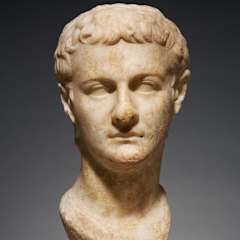
Gaius Caesar Augustus Germanicus (“Caligula”). The Roman emperor from AD 37 until his assassination.
Roman emperor from AD 37 to 41. Born on 31 August AD 12 in Antium, Italy, he was the son of the celebrated general Germanicus and Agrippina the Elder, both prominent members of the Julio-Claudian dynasty. He was a great-grandson of Augustus, the first Roman emperor, and inherited a legacy deeply entwined with Rome’s earliest imperial history.
Early Life
Gaius was raised in a military environment, often accompanying his parents on campaigns in Germania as a child. The soldiers affectionately nicknamed him “Caligula,” meaning “little boots,” after the miniature military boots he wore while among the legions. His upbringing was marked by both privilege and tragedy, with several family members falling victim to political intrigue and purges during the reign of Tiberius.
Rise to Power
After the death of his father Germanicus and a series of familial losses, Caligula became one of the last surviving male heirs of the Julio-Claudian line. When Emperor Tiberius died in AD 37, Caligula, with the support of the Praetorian Guard, succeeded him as emperor, bypassing other potential claimants.
Reign as Emperor
Caligula’s accession was initially met with widespread enthusiasm. He was young, charismatic, and the son of the much-loved Germanicus. Early in his reign, he enacted popular measures such as abolishing certain taxes and organizing lavish public games. However, after a severe illness just months into his rule, ancient sources suggest a dramatic change in his behavior, with later accounts portraying him as increasingly autocratic and erratic.
His reign became notorious for allegations of extravagance, cruelty, and claims of madness, though modern historians debate the accuracy and motivations behind these reports. Caligula’s rule saw strained relations with the Senate and the nobility, and he was known for his unpredictable and sometimes humiliating treatment of Rome’s elite.
Assassination and Legacy
On 24 January AD 41, after less than four years as emperor, Caligula was assassinated in a conspiracy led by officers of the Praetorian Guard. He was 28 years old. Following his death, his uncle Claudius was declared emperor.
Caligula’s legacy remains controversial. Ancient historians painted him as a symbol of imperial excess and tyranny, but recent scholarship often questions the reliability of these sources, suggesting that political motivations and sensationalism may have influenced their accounts. Despite the ambiguity surrounding his character, Caligula endures as one of the most infamous figures of Roman history.